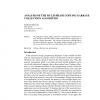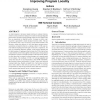99 search results - page 1 / 20 » Analysis of the Multi-Phase Copying Garbage Collection Algor... |
201
click to vote
DAPSYS
2004
Springer
15 years 8 months ago
2004
Springer
The multi-phase copying garbage collection was designed to avoid the need for large amount of reserved memory usually required for the copying types of garbage collection algorithm...
117
click to vote
SIGMETRICS
2004
ACM
15 years 8 months ago
2004
ACM
This paper explores and quantifies garbage collection behavior for three whole heap collectors and generational counterparts: copying semi-space, mark-sweep, and reference counti...
141
Voted
IWMM
1998
Springer
15 years 7 months ago
1998
Springer
Many high-level language compilers generate C code and then invoke a C compiler for code generation. To date, most of these compilers link the resulting code against a conservativ...
135
Voted
IWMM
1992
Springer
15 years 7 months ago
1992
Springer
Abstract. We present a garbage collection algorithm that extends generational scavenging to collect large older generations (mature objects) non-disruptively. The algorithm's ...
124
Voted
OOPSLA
2004
Springer
15 years 8 months ago
2004
Springer
As improvements in processor speed continue to outpace improvements in cache and memory speed, poor locality increasingly degrades performance. Because copying garbage collectors ...


